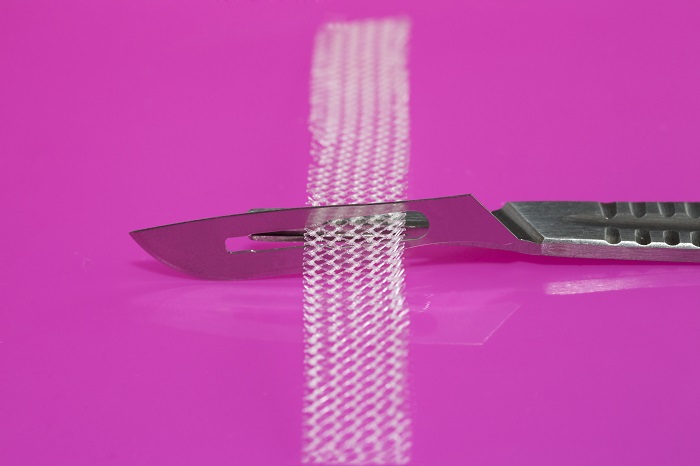
One year ago, the use of mesh in surgeries to treat incontinence and pelvic organ prolapse was immediately stopped. Cases of extreme pain and even loss of mobility soon followed suit after thousands of women across the UK began to share their stories.
But where do we stand now?
In the U.S, the FDA have ordered all manufacturers of surgical mesh intended for transvaginal repair to stop selling and distributing their products immediately. The ban has been in place since April 16 2019.
A team of researchers at the University of Texas at Arlington are also working to develop a method that will allow physicians to repair early vaginal prolapses, potentially avoiding the need for surgery or other complications. The team of bioengineers are developing a strong, bioactive bioadhesive to reattach the pelvic floor muscles early, before they detach completely, preventing further tearing and speeding up the repair process.
In the UK however, surgical mesh can still be offered to women. The National Institute of Health and Care Excellence (NICE) updated their guidelines for mesh use in prolapse surgery. According to the guidelines, doctors must:
- “explain to the woman about the type of mesh that will be used and whether or not it is permanent”
- “ensure that details of the procedure and its subsequent short- and long-term outcomes are recorded in a national registry”
- “give the woman written information about the implant, including its name, manufacturer, date of insertion, and the implanting surgeon’s name and contact details”
Although this process has vastly improved, it still leaves a lot of women questioning ‘is it safe?’
Many, including campaigners and MPs, argue that the new national guidance on urinary incontinence and pelvic organ prolapse in women neglects the serious risks that are associated with the use of surgical mesh. It is also argued that the new guidance completely contradicts the previous NICE advice from 2017 that noted mesh for vaginal prolapse should be restricted to research because of safety concerns.
What Should I Do if I Have an Implant?
If you have a vaginal mesh implant that you are concerned about, speak to the medical team that performed your operation where possible. Speak to your GP if this is not possible.
You can also call the mesh counselling hotline on 0121 314 7075, Monday-Friday 8am-6pm.
Let us know your thoughts about the latest updates on mesh.
Previous Updates
Sources
[1] Pike, H. NICE guidance overlooks serious risks of mesh surgery. BMJ. 2019; 3665:l1537.
[2] U.S Food & Drug Administration (2019) Urogynecologic Surgical Mesh Implants [online]. FDA [viewed 11/07/2019]. Available from https://www.fda.gov/medical-devices/implants-and-prosthetics/urogynecologic-surgical-mesh-implants
[3] National Institute of Health and Care Excellence (2019) Urinary incontinence and pelvic organ prolapse in women: management [online]. NICE [viewed 11/07/2019]. Available from https://www.nice.org.uk/guidance/ng123/chapter/Recommendations#surgical-management-of-pelvic-organ-prolapse
[4] EurekAlert! (2019) UTA researcher earns grant to detect, repair vaginal prolapse in early stages [online]. American Association for the Advancement of Science [viewed 11/07/2019]. Available from https://www.eurekalert.org/pub_releases/2019-01/uota-ure012319.php?fbclid=IwAR3ZGCK-FW9ZIH9boG8ms13ppIJnP2Cvap6OkZdcmriBgUKqADCbKaRTVSU



